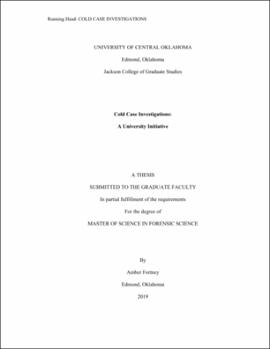Cold case investigations : a university initiative.
Abstract
Despite technological advancements and improved methodologies in forensic science and investigative practices, cold cases are a growing problem in the United States. Although there has been a surge in interest in solving cold cases due to advancements in technology, there has been very little research conducted on cold case investigation methodology. Many agencies lack the personnel and resources to devote adequate attention to cold cases. Federal dollars spent on cold case resolution in recent years focused only on those cases that could benefit due to improvements in DNA analysis techniques. The literature demonstrates that advances in other forensic disciplines can provide answers in unsolved crimes. Additionally, it has been shown that investigations often benefit simply from a case file review by a fresh set of eyes. This research was conducted to develop best practices guidelines for a cold case program in a collegiate setting in partnership with a law enforcement agency. Information from a variety of sources was reviewed to develop guidelines that would address the needs of all parties to such a collaboration. A manual entitled Best Practices & Guidelines for the Implementation and Management of a Cold Case Program in a Collegiate Setting was produced as a result of this research. This manual is intended for use by institutions of higher learning with a focus on educating students for careers in the field of forensic science and will assist instructors in implementing an upper level course for students to engage in the review and analysis of case files pertaining to unsolved crimes designated as cold cases by the collaborating law enforcement agency. Such a course is ideally suited to graduate students and as an in-house practicum for seniors.
Collections
- UCO - Graduate Theses [722]
